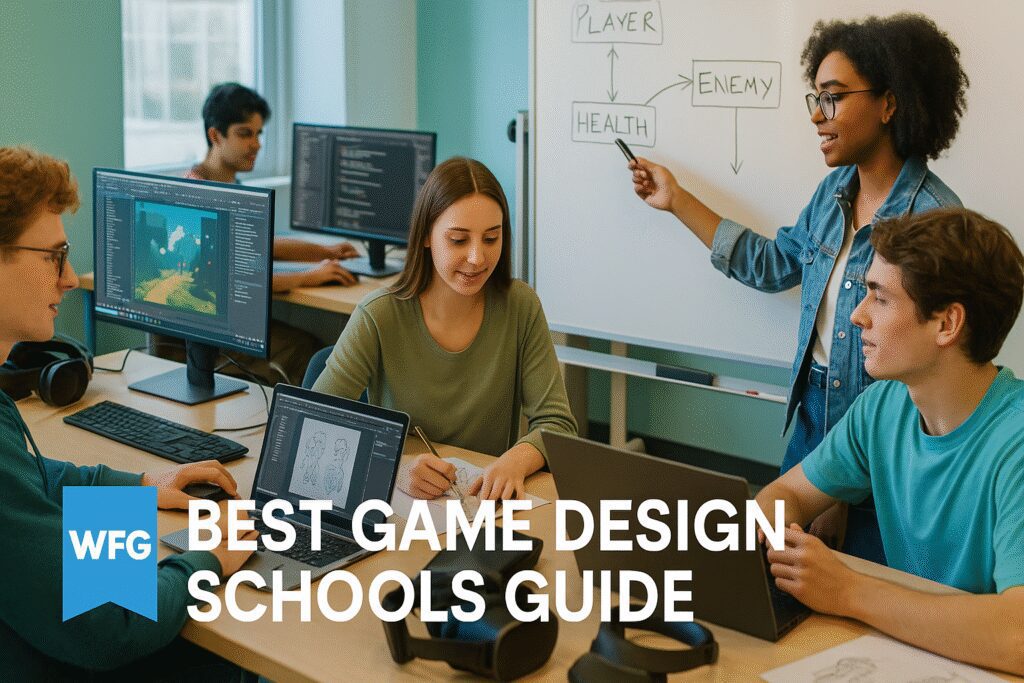Game design schools represent the gateway between your gaming passion and a thriving career in one of the world’s fastest-growing entertainment industries. With the global gaming market projected to exceed $321 billion by 2026, choosing the right educational path has never been more critical for aspiring game designers who want to transform their love for gaming into professional success.
The landscape of game design education has evolved dramatically over the past decade. Traditional computer science programs now compete with specialized institutes, online bootcamps, and hybrid learning models, each promising to unlock your creative potential. But here’s the reality check most schools won’t tell you: not all game design programs are created equal, and some might actually hurt your career prospects more than help them.
What Makes a Game Design School Worth Your Time and Money
Industry Connections That Actually Land You Jobs
The most valuable game design schools aren’t just teaching facilities—they’re networking hubs with direct pipelines to major studios. Schools worth your investment maintain active relationships with companies like Electronic Arts, Ubisoft, Blizzard Entertainment, and emerging indie studios. These connections manifest in guest lectures from current developers, internship placements, and most importantly, recruitment events where studios scout for fresh talent.

Look for programs where faculty members still work in the industry or have left recently enough to maintain their professional networks. The University of Southern California’s Interactive Media & Games Division, for instance, regularly hosts developers who’ve worked on blockbuster titles, creating opportunities for students to make meaningful connections before graduation.
Curriculum That Matches Real Studio Workflows
The best game design schools teach you the same tools and methodologies you’ll use in professional environments. This means hands-on experience with industry-standard software like Unity, Unreal Engine, Maya, and collaborative platforms like Perforce or Git. More importantly, these programs simulate real studio conditions through team-based projects that mirror actual game development cycles.
Effective curricula balance technical skills with creative development. You should expect coursework covering programming fundamentals, 3D modeling, animation, user experience design, and project management. The strongest programs also incorporate business elements, teaching you about monetization strategies, market analysis, and the realities of working within budget and deadline constraints.
Free Bingo Win Real Money: The Mobile Apps Changing How We Play
Faculty with Active Industry Experience
Academic credentials matter, but in game design education, industry experience trumps traditional qualifications. The most valuable instructors are those who’ve shipped actual games, managed development teams, or currently consult for gaming companies. These professionals bring real-world insights that textbooks simply cannot provide.
Faculty should include a mix of specialists: former lead designers who understand creative vision, technical directors who’ve solved complex programming challenges, and producers who’ve navigated the business side of game development. This diversity ensures you’re learning from practitioners who’ve succeeded in the specific role you’re targeting.
Top Game Design Schools Ranked by Career Outcomes
Traditional Universities with Strong Game Programs
Several established universities have developed exceptional game design programs that combine academic rigor with industry relevance. The University of Utah’s Entertainment Arts & Engineering program consistently ranks among the top choices, with graduates regularly joining major studios like Blizzard and Disney Interactive.
Carnegie Mellon University’s Entertainment Technology Center takes an interdisciplinary approach, encouraging collaboration between artists, programmers, and designers. Their project-based curriculum results in students graduating with professional-quality portfolio pieces and often, job offers from industry partners.
The Rochester Institute of Technology’s School of Interactive Games and Media focuses heavily on the technical aspects of game development while maintaining strong creative components. Their co-op program provides students with paid work experience at gaming companies, often leading to full-time employment upon graduation.
Specialized Game Design Institutes
Full Sail University has built its reputation entirely around entertainment media education, including comprehensive game design programs. Their accelerated format allows students to complete bachelor’s degrees in under three years, though the intensity requires significant dedication.
The Savannah College of Art and Design offers both traditional and online game design programs with exceptional resources, including motion capture studios and virtual reality labs. Their alumni network spans major studios worldwide, providing valuable networking opportunities for current students.
DigiPen Institute of Technology takes a deeply technical approach, producing graduates who excel in programming-heavy roles within game development. Their curriculum is notoriously challenging, but graduates often secure positions at prestigious studios like Valve and Nintendo.
Online Programs That Employers Actually Respect
Arizona State University’s online game design program provides flexibility for students who need to work while studying. Their curriculum matches the quality of on-campus programs, and employers recognize ASU’s strong reputation in digital media education.
Southern New Hampshire University offers competency-based online game design degrees that allow students to progress at their own pace. Their programs emphasize practical skills development and include virtual collaboration projects that simulate remote work environments increasingly common in the gaming industry.
Program Types Explained: Which Path Fits Your Goals
Bachelor’s Degree Programs vs. Certificate Courses
Four-year bachelor’s programs provide comprehensive education covering all aspects of game development, from initial concept to final shipping. These programs typically include general education requirements alongside specialized coursework, resulting in well-rounded graduates who understand both the creative and business aspects of gaming.
Certificate programs and shorter courses focus intensively on specific skills, making them ideal for career changers or working professionals seeking to add game design expertise to existing skill sets. Programs like those offered by Coursera in partnership with major universities can provide industry-recognized credentials in 6-12 months.
The choice between degree and certificate programs often depends on your current situation and career goals. Recent high school graduates typically benefit from comprehensive degree programs, while working professionals might prefer focused certificate courses that can be completed while maintaining employment.
Full-Time vs. Part-Time Study Options
Full-time programs allow for complete immersion in game design studies and typically provide the richest collaborative experiences. Students can participate in game jams, join development clubs, and dedicate significant time to portfolio development. However, full-time study requires substantial financial commitment and prevents concurrent employment in most cases.
Part-time programs accommodate students who need to work while studying, though they require exceptional time management skills. These programs typically take longer to complete but allow students to apply learned skills in current employment or personal projects immediately.
Evening and weekend programs have become increasingly popular, especially in tech hubs where many students work in related industries during the day. These schedules work particularly well for students with some existing technical background.
Portfolio-Based vs. Theory-Heavy Approaches
Portfolio-focused programs emphasize practical skill development and hands-on project creation. Students graduate with professional-quality work samples that directly demonstrate their abilities to potential employers. These programs often simulate real studio environments and prepare students for immediate workforce entry.
Theory-heavy programs provide deeper understanding of game design principles, psychology of player engagement, and historical context of gaming evolution. While these programs may require additional self-directed skill development, graduates often excel in leadership roles and innovative design thinking.
The most effective programs blend both approaches, ensuring students understand fundamental principles while developing practical implementation skills.
Cost vs. Career ROI: Making the Investment Work
Average Program Costs and Hidden Expenses
Game design education costs vary dramatically based on institution type and program duration. Private specialized institutes can cost $80,000-$150,000 for complete programs, while public university options range from $40,000-$80,000 for in-state students. Online programs often provide more affordable alternatives, with total costs ranging from $20,000-$60,000.
Hidden expenses include high-end computer equipment, software licenses, and specialized hardware like graphics tablets or VR headsets. Students should budget an additional $3,000-$8,000 for technology requirements beyond tuition costs.
Living expenses in major gaming hubs like Los Angeles, San Francisco, or Seattle significantly impact total educational investment. Students should research local housing costs and consider whether remote learning options might provide better value.
Starting Salaries in Different Game Industry Roles
Entry-level game designers typically earn $45,000-$65,000 annually, with significant variation based on company size and location. Major studio positions often offer higher starting salaries but also require exceptional portfolios and skills.
Specialized roles command different salary ranges: technical designers often start at $55,000-$75,000, while user experience designers may begin at $50,000-$70,000. Programming-focused roles generally offer the highest starting salaries, often exceeding $70,000 for new graduates with strong technical skills.
Geographic location significantly impacts earning potential. Studios in expensive cities like San Francisco offer higher salaries but correspondingly higher living costs, while smaller markets might provide better quality of life despite lower absolute wages.
Scholarship Opportunities and Financial Aid Options
Many game design schools offer merit-based scholarships specifically for creative portfolios or technical achievements. Students should prepare strong application materials well in advance of scholarship deadlines, which often precede general admission deadlines.
Industry organizations like the International Game Developers Association offer scholarships and grants for underrepresented groups in gaming. These opportunities often include mentorship components and networking opportunities beyond financial support.
Federal financial aid applies to accredited game design programs, and students should complete FAFSA applications regardless of family income level. Work-study programs at universities sometimes include positions within game development labs or research projects.
Admission Requirements and How to Stand Out
Portfolio Requirements That Impress Admissions Teams
Strong game design portfolios demonstrate both creative vision and technical implementation ability. Include completed game projects, even if they’re simple, rather than just concepts or artwork. Admissions committees want to see evidence that you can transform ideas into playable experiences.
Document your design process thoroughly, including initial concepts, iteration cycles, and problem-solving approaches. This documentation proves your understanding of professional development workflows and your ability to think critically about design decisions.
Include diverse project types showcasing different skills: a mobile puzzle game demonstrates understanding of touch interfaces and progression systems, while a multiplayer prototype shows grasp of networking concepts and competitive balance.
Academic Prerequisites You Actually Need
Most game design programs require strong performance in mathematics, particularly algebra and geometry. Programming experience, while helpful, isn’t always required for admission, though demonstrated logical thinking ability is essential.
Art-focused game design tracks may require traditional art portfolios demonstrating fundamental skills in drawing, color theory, and composition. However, digital art skills often carry more weight than traditional media expertise.
Writing samples can strengthen applications significantly, as games increasingly rely on narrative elements. Strong communication skills prove essential for collaborative development environments.
Interview Tips from Former Admissions Officers
Prepare to discuss specific games you admire and explain why their design elements work effectively. This demonstrates analytical thinking about game mechanics and player experience, key skills for successful designers.
Be honest about your current skill level while expressing enthusiasm for learning and improvement. Admissions officers prefer students who understand their starting point and have realistic growth expectations over those who overestimate their abilities.
Research faculty members and current projects at your target schools. Asking informed questions about specific programs or research initiatives demonstrates genuine interest and helps you stand out from generic applicants.
Red Flags: Game Design Schools to Avoid
Warning Signs of Diploma Mills and Scams
Legitimate game design schools require significant effort and time investment. Programs promising game design expertise in just a few months or guaranteeing job placement should raise immediate suspicions. Quality education takes time, and reputable schools cannot guarantee employment in competitive industries.
Beware of schools that focus heavily on marketing rather than curriculum details. Legitimate programs readily share information about faculty qualifications, course requirements, and graduate outcomes. Schools that avoid providing specific information about their programs often have something to hide.
Check accreditation status carefully. Regional accreditation ensures educational quality and allows for credit transfers, while unaccredited programs may not be recognized by employers or other educational institutions.
Programs with Poor Industry Reputation
Research graduate employment rates and employer feedback about different programs. Schools with strong reputations have alumni working at recognizable studios and can provide specific examples of graduate success stories.
Programs that haven’t updated their curricula to reflect current industry standards may leave students with outdated skills. Look for courses covering current engines, development methodologies, and emerging platforms like virtual reality or mobile gaming.
Faculty turnover rates can indicate program stability and quality. High turnover might suggest internal problems or inadequate compensation that drives qualified instructors elsewhere.
Unrealistic Job Placement Promises
No legitimate school can guarantee employment in the gaming industry, which remains highly competitive. Be skeptical of programs claiming 100% job placement rates or promising positions at specific companies.
Examine job placement statistics carefully. Some schools count any employment as “job placement success,” even if graduates work in unrelated fields. Look for specific information about gaming industry employment rather than general employment rates.
Quality programs focus on skill development and portfolio building rather than making unrealistic promises about career outcomes. They should prepare you to compete successfully while being honest about industry challenges.
Alternative Paths: When Traditional School Isn’t Right
Self-Taught Routes That Work
Many successful game designers have built careers through self-directed learning, particularly in the indie gaming scene. Online resources like Unity Learn, Unreal Engine documentation, and YouTube tutorials provide comprehensive technical education at minimal cost.
Self-taught designers must be exceptionally disciplined and proactive about skill development. Success requires dedication to consistent learning, regular project completion, and active community participation for feedback and networking.
The indie game development community offers substantial support for self-taught designers through forums, Discord servers, and local meetups. These communities provide mentorship opportunities and collaborative project possibilities.
Industry Mentorship Programs
Several major studios offer mentorship programs connecting aspiring designers with experienced professionals. Programs like Microsoft’s LEAP and Unity’s Creator Advocate program provide structured guidance and industry insights.
Professional organizations like the International Game Developers Association facilitate mentorship connections through local chapters and online platforms. These relationships often prove more valuable than formal education for career development.
Mentorship relationships require commitment from both parties and work best when mentees come prepared with specific goals and questions. The most successful mentorships involve regular communication and concrete skill development objectives.
Bootcamps and Intensive Workshops
Game development bootcamps offer compressed learning experiences focusing on practical skill development. Programs like Lambda School’s game development track provide intensive training with job placement assistance.
Industry conferences often include workshop components where working professionals teach specific skills or techniques. These workshops provide concentrated learning opportunities and valuable networking possibilities.
Game jams and hackathons serve as informal educational experiences where participants learn through collaboration and time-constrained project development. Regular participation builds skills while expanding professional networks.
Frequently Asked Questions
How long does it take to complete a game design degree?
Traditional bachelor’s degree programs typically require four years of full-time study, though some accelerated programs can be completed in three years. Associate degree programs usually take two years, while certificate programs range from six months to two years depending on their scope and intensity.
Do I need to know programming to get into game design school?
Most game design programs don’t require programming knowledge for admission, though basic logical thinking skills are essential. Many programs include programming courses as part of their curriculum, teaching students the technical skills they need alongside design principles.
What’s the difference between game design and game development?
Game design focuses on the creative and conceptual aspects of games, including mechanics, player experience, and overall vision. Game development encompasses the broader process of creating games, including programming, art creation, audio implementation, and project management. Many programs cover both areas to produce well-rounded graduates.
Browser Games RPG Free No Download: The Best Adventures You Can Play Instantly
Are online game design degrees respected by employers?
Online degrees from accredited institutions with strong reputations are increasingly accepted by employers, especially as remote work becomes more common in the gaming industry. The key factors are the school’s reputation, accreditation status, and the quality of your portfolio rather than whether you studied online or on-campus.
How important is the location of my game design school?
School location can impact networking opportunities and internship possibilities, with schools near major gaming hubs offering more direct industry connections. However, strong programs in smaller markets often provide excellent education and may offer better individual attention from faculty.
Can I get a job in gaming without a degree?
While possible, entering the gaming industry without formal education requires exceptional self-motivation and skill development. Success typically depends on building an impressive portfolio, gaining experience through personal projects or indie development, and networking within the gaming community.



